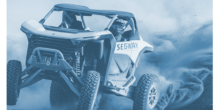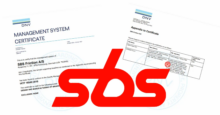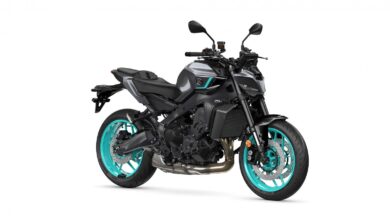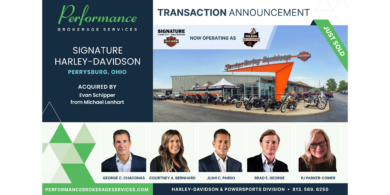Aug. 9, 2010 – Boom & bust
 BEND, ORE. — Known for its picturesque, mountainous scenery, this central Oregon town is a second-home getaway and quaint vacation destination, luring hikers and riders in the summer and skiers in the winter.
BEND, ORE. — Known for its picturesque, mountainous scenery, this central Oregon town is a second-home getaway and quaint vacation destination, luring hikers and riders in the summer and skiers in the winter.
However, the past year has been anything but pleasant there.
An exploding economy in the mid-2000s plunged in a matter of months, giving way to some of the nation’s worst foreclosure rates, spiraling home values and shockingly high unemployment.
And Kathy Jo Porter and her husband David Bingham of Bend Euro Moto, a multi-brand dealership, were right in the thick of it.
Sitting outside a Bend pizza shop, Porter hardly glances at the local daily newspaper’s cover story about an automobile dealership closing. “After 94 years, Thomas closes doors,” the headline reads.
“That’s a business that’s gone through all kinds of fluctuation,” she said, “and they’re finally calling it quits.”
They’re not alone. Porter and her husband made the same gut-wrenching decision not long ago. Their motorcycle dealership — a one-time booming store that won numerous awards for its sales prowess — fell victim to a devastating economic collapse. In just months, Central Oregon’s unemployment increased double digits, home values decreased the fastest in the country, and residents fled from the crumbling economy.
As a result, major unit sales for Bend Euro Moto all but disappeared, inventory accumulated and mounting flooring costs overwhelmed the store’s balance sheet. The Oregon store became one of an unknown number of powersports dealerships to close nationally over the past year. Industry estimates have put national dealer closures at anywhere from 3 percent-10 percent of the entire U.S. dealer network.
“It was a very emotional time for us,” Porter said. “This was our heart and soul.”
Strapping in for a ride
In 1997, Bingham graduated in aviation mechanics and then worked with Porter at an Idaho dealership. Avid Ducati enthusiasts and riders, the two moved to Central Oregon in 2001 to open a service shop, which was little more than 1,250 square feet.
“This area needed to address the European bike community,” said Porter. “We only worked on European bikes, and from the beginning we were busy.”
A couple years later, a buzz among the European riders peaked their interest.
“We heard a little rumor that Ducati was interested in Bend,” said Porter.
Jumping on the chance, Porter and Bingham requested a meeting with Ducati’s regional sales rep, Kevin Davis. “We knew a lot of people in Ducati because we had been in the Ducati community for a while,” Porter said, adding they knew Davis, so it was like calling on an old friend.
At that point, in 2005, there were few Ducati motorcycles in the area, so Porter and Bingham called everyone they knew and told them to bring their bikes down to the shop to give a good showing.
After a promising meeting, weeks went by without a word from the OEM.
Porter called a longtime friend who owns a Seattle dealership and asked for advice. “He gave me Michael Lock’s (the then-Ducati North America CEO) e-mail,” she said. “I wrote him this epic email.
“I said, ‘This is what we want to bring to Bend. This is what we have to offer, and this is how we want to represent the brand. We don’t have any interest in any other brand. We’re Ducati through and through.’
“I found out later he circulated the e-mail to his sales network, and said, ‘We wouldn’t have trouble in the U.S. market if all our dealers had this kind of passion.’”
At 9 the next morning, Porter received a call from Lock himself.
“(Lock) said, ‘We don’t want to add a lot of new dealers right now, but if we didn’t give you a chance, we’d be missing out on what we do because of your love and passion for the brand.’”
After getting the franchise, Porter and Bingham moved into a larger facility right around the corner in March of 2005. From the start, the owners had a strong, close relationship with Lock and the Ducati staff due to their passion for the brand.
“To this day I don’t understand why everyone doesn’t ride a Ducati. I drank the Kool-Aid,” Porter said, referring to her brand passion and loyalty.
Boom
Bend had such an incredible swing in the early 2000s, the phrase, “Boom and Bust” was coined by national news sources to describe the area’s economy.
In less than 20 years, the town’s population quadrupled. From 2001-2005, the median value of homes rose 80 percent, and in 2005, about 700 new homes were built each month.
In the height of that, Bend Euro Moto had its opening and saw profitability its first year.
“We had growth from 2005-’08. Our first year we represented Ducati and Genuine Scooters,” said Porter. “We had great luck with Genuine. Bend is very hipster, metropolitan living, going green.”
The first full year as a Ducati dealership, Bend Euro Moto doubled its gross sales over 2005 and added Husqvarna.
“For a brand new dealership in its infancy to produce a profit is a big thing with start-up costs,” said Porter, “and we were relatively under funded from the beginning.”
The dealership saw another huge jump in its gross sales in 2007 as it was up 25 percent over the previous year.
“We had record-breaking market share,” she said, noting the volume even surprised Ducati. “The Italians didn’t believe it could happen in Central Oregon.”
Ducati recognized the dealership’s success with numerous awards, including National Best New Dealer, National Best Marketing, Northwest Dealer of the Year and they were also nominated for North American Dealer of the Year.
Bingham joked to Porter one day about peaking too early. “It’s too early to be doing this good,” he said.
“We were breaking sales records,” Porter recalled, “and we were only a couple years old. There was no saving anything for the future. We just kept growing.”
That continued even through the winter of 2008, when the first signs of a national recession emerged.
“In 2008, we actually had another 10 percent rise in gross sales, but the bulk of that was because of an incredibly busy summer selling scooters as a result of the increased gas prices,” said Porter. “It gave us sort of a false sense of what was going on because the reality was our focus brand, Ducati, had fallen off significantly.”
Bust
As fast as Bend flourished, the town collapsed even quicker. People couldn’t escape fast enough, and for good reason.
Within two years, values of homes fell 40 percent, which at one point was the worst in the nation. The town, known for tourism and its rapid growth, relied heavily on construction — a nightmare waiting to happen in a down economy. Around 2005, about 5 percent of the national workforce relied on construction. But in Central Oregon, that percentage was around 12 percent.
When construction stopped, Bend and the surrounding region crumbled. The unemployment rate skyrocketed from 4 percent to 15 percent.
“When it fell off, it fell off hard, overnight,” Porter said. “It wasn’t like a spiraling down crash. It was like the rug had been yanked out from underneath us.”
The collapse took its toll on 2009 motorcycle sales. Nationally, on-road motorcycle sales decreased more than 27 percent nationwide for the first quarter in 2009 over the year-ago period. But Bend Euro Moto felt the drop even worse. Sales from October 2008 to March 2009 dropped 60 percent.
That spring, Ducati North America CEO Lock called the shop and expressed concern about the market. “‘There’s nothing selling in your area. No one is buying anything,” Porter recalled of the Lock phone call. “‘You still have a reasonable market share, but of nothing.’
“My heart sank,” she said. “For the first time, I had to entertain the thought of what we should do. We knew how many bikes we sold, and if we still had good market share, we knew it was desperate here.
“That scared me because I couldn’t imagine closing the store.”
Beginning of the end
The call got Porter thinking, and she began entertaining the idea of bringing on an investor. She also spent the summer of 2009 scrambling to make the best of every customer. Phone calls were made to every previous customer about service and new unit specials. Unfortunately, many of the calls turned out to be fruitless efforts as most consumers had moved away.
“When things started getting bad, you’d go a day without seeing a customer,” said Porter. “Nobody had any money. Bend was a black hole of money.
“People would stop in (the dealership) and look, but just couldn’t afford to buy anything.”
That was better than other days where the staff didn’t see a single person.
“One day our first customer walked in at 1:30 p.m., and we were so excited to see someone,” Bingham said. “It turned out to be someone looking for money, a solicitor.”
Through follow-up calls and CSI info, Bend Euro Moto discovered nearly 70 percent of the motorcycles it sold in 2009 were to people who either had second homes in Bend or were full-time residents who left town shortly thereafter, says Porter.
Campaigning in other areas for business wasn’t an option because Bend is not close to any other large cities. “There’s no one around here for 150 miles,” said Porter. “By the middle of ’09, about July a year ago, we had dug a pretty deep hole.”
But things continued to worsen.
“Every month in 2009 had in excess of 50 percent decreases from the year before,” said Porter, “but the summer months were where we saw the bottom literally fall out.”
In August 2009, the dealership was down 72 percent in new unit sales from August 2008.
That summer was incredibly draining for the couple as they tried keeping the dealership afloat, including cutting expenses in every possible area.
“Payroll was down to the bare minimum. We went from 15 employees down to four,” said Porter, “and there were no parts purchases that weren’t absolutely necessary.”
The biggest draining factor, however, was the dealership’s flooring costs.
“Rent was still the same, utilities were expensive in the winter and my flooring was insanely expensive because we had so many unsold Ducatis from the prior year,” said Porter. “Everything we did, every cent we generated went to flooring to keep the thing floating.”
The lack of sales and resulting excess inventory created stress on Porter and her husband that they had never felt before.
“I’m a motorcyclist enthusiast. Before that (summer), I’d walk into my store in the morning and feel blessed every day. Look at what I get to do every day. Look at this life I’m living,” said Porter. “I went from it couldn’t be better to walking in and looking at the 1098R and thinking, ‘How am I going to get rid of that albatross?’ A bike I should’ve had admiration and love for, I hated. It was a burden to me.”
In attempt to keep afloat, Porter talked to a few prospects about investing in Bend Euro Moto, a couple of customers who she felt may be interested and able, but nothing materialized and time was running out.
An investor?
Flooring costs and other expenses were digging a hole faster than sales could absorb. When it had gotten so bad the dealership was within a week of closing, one of their customers, who Porter had talked to arlier, asked if they were still looking for an investor.
Unbeknownst to him of the severity of the situation, Porter laid out the urgency of time.
“Purely on hand shake, the investor wired money to get us through,” she said. “I didn’t care. I said, ‘We’ll figure out the details later.’”
The Bend economy, however, didn’t get any better, and the dealership wasn’t breaking even, much less making a profit.
In the fall of 2009, Ducati approached the dealership again because of a lack of sales in Central Oregon — of any motorcycles. Ducati officials were concerned the Bend economy wasn’t getting any better, and there were no signs of relief in the near future.
Ultimately, the dealership and the OEM had to figure out something, and soon. Porter said Ducati didn’t think the area could support the dealership, so they gave her and her husband some options.
Last-ditch effort
Ducati suggested Porter and Bingham look at more promising regional markets where they could move the franchise. One of the options was Olympia, Wash., located between Seattle and Portland. Like Bend, it was a smaller town, and the couple was originally from the Seattle area.
It was a good fit, notes Porter.
“Ducati really envisioned us getting into Olympia and creating the same thing we did in Bend,” said Porter. “A cool place to go hang out, a little more down-home, not the hustle of downtown, not the multi-brand store.”
Porter and Bingham put the new option on the table for the investor. “‘If we’re going to do this thing and ever make any money, then we have to get out of here,’” the two told the investor. “It was the only fiscally responsible thing to do.”
To the couple’s dismay, the investor was attached to Bend and reluctant to put his money elsewhere.
There were a few different ways in going about the move, including keeping the Bend store, but scaling way down, or completely closing the dealership and starting fresh.
Then it got complicated.
“(The investor) came to the International Motorcycle Show and met some people from Ducati,” said Porter. “We all seemed to be on the same track, but we couldn’t seem to get anything on paper.”
A few months later at the national Ducati dealer meeting, Lock had four or five dealerships talk about how they were fighting the recession. Among them, Porter and Bingham shared their story.
After the meeting and into March, the owners still were having trouble ironing out the details with the investor. “The only way the (investor’s) attorneys said they would do it was if the investor had 51 percent ownership, and we would have 49 percent,” Porter said. “Why would I do that? When a majority owner could just say, ‘I’m just not having fun anymore, so I’m just going to close.’ Why not work for someone else? Punch a time clock, and not worry about the light bill or the gas bill and not be able to sleep at night.
“Putting your heart and soul and a bazillion hours into a store, you can’t give someone else (majority ownership).”
No choices left
“Without (the investor’s) financial contributions, we were dead in the water,” said Porter. “David and I just looked at each other and said, ‘We’re done. There’s no possible way to fund the Olympia project and Bend had no pulse whatsoever.’ We just had to shut it down.”
Porter and Bingham told their two remaining employees who were going to make the move with them that there was nothing left.
“It’s like fostering along a beloved dog with a terminal illness,” described Porter. “If there’s any hope you can keep it alive, it’s worth exhausting every effort imaginable to that end. But there comes a point when it’s not fair to the dog to keep him alive just because you can’t bear the thought of losing him.”
With the decision made and the shop closed, Porter says they finally felt a sense of relief. “The weight was suddenly lifted off our shoulders,” she said. “I felt that last year was really long, the difficulty we went through and not having a plan. It was really hard. We just knew we were done.
“As much as we knew in our hearts that our market fell in on itself, you can’t help but feel as though you’ve failed to some degree.”
What now?
For Porter, the 2009 call from Lock was the first time in a long while where she had to think of a future — a future outside of a dealership.
“If you would’ve asked me a year before that, ‘What are you going to do the rest of your life?’ I would have said, ‘I’m going to sell Ducatis in Bend, Ore., forever,’” she said. “I had no idea it could get so bad.”
Today, Porter says they’re rooted in Bend. “We don’t know,” she said of their plans. There’s a possibility Bingham will go back into aviation, and Porter is looking into marketing and staying involved in the industry. But nothing is for certain. “I’d like to punch in and punch out,” Porter says, “and not lose sleep at night.” PSB








